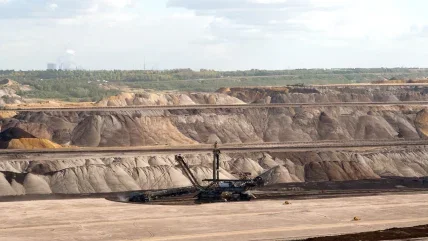
Licensing of new coal mines is set to be restricted as the government commits to bringing in legislation which will prohibit new coal mining projects.
The government today (14 November) confirmed it will introduce new legislation as soon as possible to restrict the future licensing of new coal mines.
Coal power remains the largest source of energy-related CO2 emissions globally. Phasing it out is a crucial step to tackling climate change and limiting global temperature rises to 1.5C, while providing important health benefits through improved air quality.
Britain became the first major economy to stop burning coal for power in October, with the closure of the country’s last coal-fired power station at Ratcliffe on Soar, following 50 years of service. It means coal has gone from generating around 40% of the UK’s electricity supply in 2012 to 0%.
The Energy Minister has paid tribute to the coal miners who “powered our country”- saying that they leave a legacy that this country can be proud of.
As the coal age ends, the clean energy age is ramping up, with the government committing to unprecedented investment in homegrown clean energy in the UK including carbon capture and hydrogen.
As part of the government’s clean energy superpower mission, this continued transition away from fossil fuels will create hundreds of thousands of good new jobs across the UK and revitalise the country’s industrial heartlands.
It comes after the independent National Energy System Operator (NESO) confirmed last week that achieving clean power by 2030 is achievable and can unlock cheaper, more secure electricity.
Energy Minister Michael Shanks said:
Coal mining powered this country for over 140 years and we owe a huge debt to workers who kept the lights on for homes and businesses across the country.
Now the UK is in prime position to lead the way in phasing out coal power around the world, which remains the single largest contributor to global emissions.
By consigning coal power to the past, we can pave the way for a clean, secure energy system that will protect billpayers and create a new generation of skilled workers.
The UK has led the way in meeting global climate change targets to phase out coal-fired power. The government’s plan to prevent future coal mining is another step in its mission to make Britain a clean energy superpower, by transitioning away from fossil fuels to cleaner, homegrown energy sources.
Since July, the government has accelerated Britain’s transition, by reversing the onshore wind ban in England, approving 2GW of new solar projects to power hundreds of thousands of homes, announcing the biggest ever investment in offshore wind, and launching Great British Energy that will own and invest in clean power projects across the UK.
To support workers, the government has also set up the Office for Clean Energy Jobs to help the next generation of skilled workers to access UK-wide job opportunities that the government’s clean energy superpower mission will help create.
Unions worked closely with Ratcliffe on Soar’s owner, Uniper, on a strong redundancy package including identifying opportunities for the plant’s staff such as internal transfers, roles with external companies and training courses.
On top of this, the government recently confirmed £21.7 billion funding for carbon capture projects in the North West and North East of England, which is set to support up to 50,000 jobs, as well as £2.3 billion for the first round of electrolytic hydrogen production contracts.
At the COP29 Summit this week in Baku, Azerbaijan, the Prime Minister announced the Clean Industry Bonus that will offer £27 million per Gigawatt to offshore wind developers who invest in the UK’s historic industrial heartlands, coastal areas and oil and gas communities.
It follows confirmation that 120,000 former mineworkers will receive a 32% boost to their pensions, as £1.5 billion of money that was kept from their pensions is handed over to their schemes, ensuring those who powered the country for decades finally get the just rewards from their labour.






